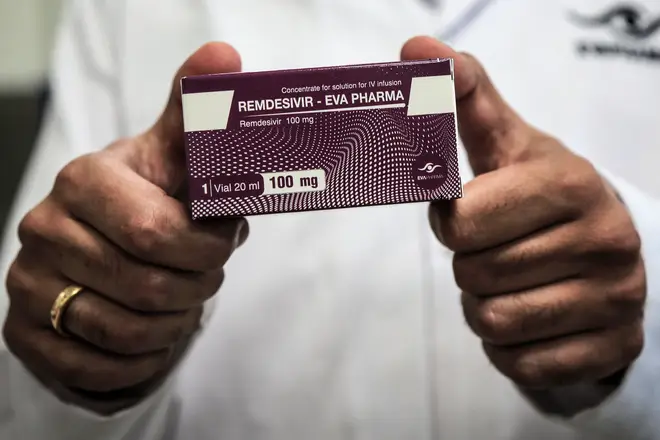
Matthew Wright 7am - 10am
1 July 2020, 08:48

The Trump administration has bought up virtually the entire stock for the next three months of one of the drugs proven to work against Covid-19, leaving none for the UK, Europe or most of the rest of the world.
On Monday the US Department of Health and Human Services (HSS) announced it had purchased more than half a million treatment courses of remdesivir for American hospitals.
Remdesivir is an anti-viral drug that was developed for use against Ebola which has been approved in the US and the UK after data showed it can help cut recovery time by around four days.
But warnings have been issued there is no clinical trial data as yet to suggest it improves survival from coronavirus.
Experts have expressed concern at the White House move and the wider implications of the USA bulk purchasing the entire stock of any potential vaccine.
“They’ve got access to most of the drug supply [of remdesivir], so there’s nothing for Europe,” said Dr Andrew Hill, senior visiting research fellow at Liverpool University.
“Imagine this was a vaccine,” he said. “That would be a firestorm. But perhaps this is a taste of things to come.”
The purchase represents 100 per cent of the US pharmaceutical firm Gilead's projected production for July (94,200 treatment courses), 90 per cent of production in August (174,900 treatment courses), and 90 per cent of production in September (232,800 treatment courses), alongside an allocation for clinical trials.
HHS secretary Alex Azar said in a statement: "President Trump has struck an amazing deal to ensure Americans have access to the first authorised therapeutic for Covid-19.
"To the extent possible, we want to ensure that any American patient who needs remdesivir can get it.
"The Trump administration is doing everything in our power to learn more about life-saving therapeutics for Covid-19 and secure access to these options for the American people."
Oxford University's Professor Peter Horby, chairman of the New and Emerging Respiratory Virus Threats Advisory Group (Nervtag), said manufacturer Gilead would be under "certain political pressures locally" as a US company.
He said: "It does raise two very important questions: what is a fair price for a drug, and what is fair access to a drug, and those are common issues but are particularly important in a global crisis like this.
"That's part of the fair access question - the trial that gave the result that allowed remdesivir to sell their drug wasn't just done in the US, there were patients participating through other European countries, in the UK as well, and internationally, Mexico and other places.
"And I wonder how they would feel knowing now that the drug is going to have restricted availability in their own country and would they have volunteered for that trial if they had known that?"
It also raises questions if a vaccine is found, he said.
Gilead has said it will charge 2,340 US dollars (£1,900) for a typical treatment course for people in the US and other developed countries.
It will sell for less in poorer countries where generic drug-makers are being allowed to produce it.
Critics in the US attacked the price because taxpayers have funded much of the drug's development.